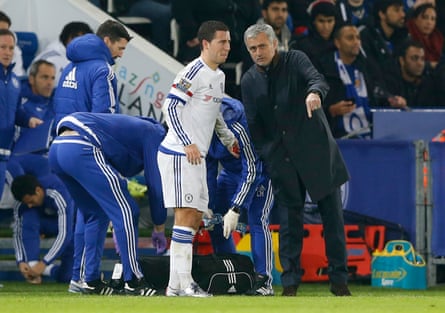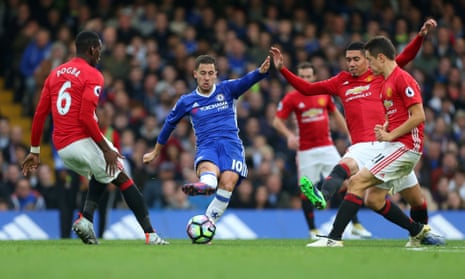Fans, content with a perfunctory victory, were beginning to drift away from Stamford Bridge. Chelsea were leading Porto 2-0, having been in control for most of the game. In a turbulent season, the Champions League had again provided a pocket of calm. And then José Mourinho decided to take off Eden Hazard, who had been involved in the buildup to both Chelsea goals. It had probably been Hazard’s best performance of the season to that point and he left the pitch to warm applause. He slapped hands with Loïc Rémy but then, as Mourinho went to congratulate him, Hazard shrugged him off.
It is easy, of course, to read too much into individual moments in retrospect but even at the time that felt telling. To show such obvious disdain for your manager in the moment of victory exposed the “palpable discord” that existed within the squad a week before Michael Emenalo, the Chelsea technical director, spoke of it in the wake of Mourinho’s sacking. From that moment, it felt that Mourinho was doomed, that, even with his abilities, there was no way back.
Then, as the curtain was falling, even during that final game away at Leicester City five days later, as Claudio Ranieri dealt the final blow to avenge his own sacking by Chelsea 12 years earlier, there came the strange incident of Hazard’s hip. Mourinho clearly felt Hazard, who had been troubled by the problem since the summer, was not particularly badly injured and cajoled him to go back on after treatment on the touchline, only for the Belgian to decide within seconds that he did not fancy it and march off, ignoring his manager as he did so.
Not surprisingly, Hazard was one of three players highlighted as “rats” by disgruntled Chelsea fans the following weekend as the post-Mourinho age began with a comfortable victory over Sunderland. Of all the many things that went wrong for Mourinho at Chelsea last season, the most significant was surely the disintegration of his relationship with the Belgian. It would be misleading to suggest some feud still simmers between the two but as Chelsea go to Old Trafford on Sunday for what appears the last significant obstacle on their run-in to the title, the fraying of their bond stands as an emblem of the collapse of Mourinho’s Chelsea reign.
Right from the start, Mourinho would provoke Hazard in front of the squad, telling the team: “Today we’re playing with 10,” to try to goad him into great defensive effort. Initially, Hazard, used to more overtly supportive managers, was troubled. “If he looks you in the eye, it’s terrifying,” he said.
Hazard is not a natural rebel, however. He accepted his manager’s ways, even if he preferred to go home and spend time with his family after training rather than staying at Cobham for extra gym work. The two found an understanding and, while there were occasional hiccups, as when Mourinho publicly criticised Hazard after the Champions League defeat by Atlético Madrid in 2014 – “Eden is the kind of player who is not so mentally ready to look back at his left-back and live his life for him,” he said, after Hazard had commented that Chelsea were better counterattacking than taking the game to the opposition – the relationship worked. When Hazard was named Chelsea’s players’ player of the year and joked that the other nominees would have to work harder, Mourinho appreciated the dig.

That was the height of their connection. The manager recognised Hazard as a humble, diligent player lacking a little ambition. Hazard’s father announced that he saw Mourinho as the manager to give his son “a little more ego”, to make him “a wonderful player” as well as the “fantastic dad and wonderful husband” he already was. Mourinho began to acknowledge his respect for Hazard, highlighting an opponent in team meetings and saying he was “no Maradona, no Messi, no Hazard”.
The warmer approach brought the best out of Hazard and Chelsea won the Premier League as Hazard was named PFA and Football Writers’ player of the season.
But then Mourinho ramped up the pressure, describing Hazard as “my new Messi” while at the same time urging him to take more defensive responsibility. At the same time, Hazard was struggling to recover from a hip problem that afflicted him until last April. At one point a frustrated Mourinho allegedly told him: “You’re not good enough for the top. I’ll have to sell you.” He began to criticise him in press conferences again.
As reports surfaced that the pair had fallen out, they met to discuss the situation. Hazard asked to play centrally and Mourinho agreed for the home game against Liverpool. With the score at 1-1, though, Mourinho took him off, shattering what remained of Hazard’s confidence.
Yet there is no acrimony between the two. When Mourinho was sacked, Hazard sent him a text message saying he felt responsible because he had not been at the same level as before. Mourinho replied, accepting Hazard’s sentiment and wishing: “Good luck to you and your wonderful family.” Mourinho felt he lacked the necessary hardness; by the end Hazard, along with a number of players, felt wearied by Mourinho’s relentless abrasiveness. In Hazard was expressed a wider malaise.
Hazard has clearly benefited from taking a more central role this season. Playing almost as an inside-left in Antonio Conte’s 3-4-2-1, he has been able to drift infield, knowing Marcos Alonso is always there to go outside him and offer creative width, while also being able to initiate the press, if required, on the opposing full-back. For all the meticulousness of Conte’s planning, that perhaps has made his movement less predictable and with that freedom within a system some of the swagger has returned to his play, most notably in that goal against Arsenal when he beat Laurent Koscielny at both the beginning and the end of a 40-yard burst.
Hazard has taken full toll on Mourinho as well, scoring one and generally sparkling with menace in Chelsea’s 4-0 win over Manchester United. So dangerous was he that for the FA Cup quarter-final in March, Mourinho seemingly targeted Hazard. Whatever the rights and wrongs of Ander Herrera’s dismissal in that game, the red card resulted from Hazard being kicked every time the ball came near him, an intriguing focus, taking into account Chelsea’s slickness as a unit this season.
Given the way that game went, any strategy to counter Hazard on Sunday will have to be rather more subtle. And if United are to prevail, Hazard will have to be neutralised. For Mourinho, perhaps, that is not only a tactical imperative but also a psychological one.

Comments (…)
Sign in or create your Guardian account to join the discussion